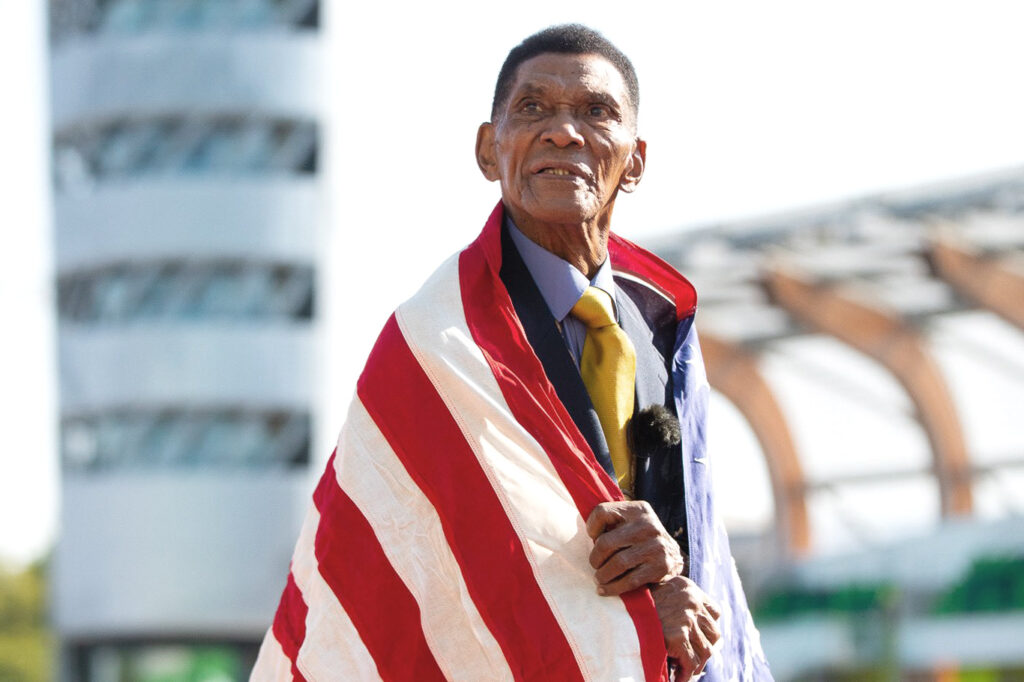Otis Davis, who won two gold medals for the United States at the Rome Olympics in 1960, including a world record performance in the 400m, died on Saturday in a hospice facility in North Bergen, N.J. He was 92.
Davis’ alma mater, the University of Oregon, announced his death and a cause was not revealed.
He served four years in the Air Force and later attended Oregon on a basketball scholarship. Davis never ran but believed he could play professional basketball. While passing a track and field practice in 1958, Davis proclaimed that he was faster than the everyone on the track.
Davis approached coach Bill Bowerman and asked for a spot on the team. Bowerman had Davis try out the high jump, to help fill a need on the roster. His form was poor, so Davis later switched to sprinting and made an immediate impact at the collegiate level. He excelled in his first events on the track — the 220-yard dash and 440-yard dash — winning both races.
In 1960, at age 28, he qualified for the Olympics just two years after starting his track career. He just made made the team with the third place finish at trials. As the oldest member of the American track and field roster, his teammates nicknamed him “Pops.”
At the Rome Games, Davis faced steep competition with German runner Carl Kaufmann seen as the favorite to win the 400m final. But he surged in the late moments of the race and became the first athlete to break 45 seconds to take gold in 44.9. His photo finish win became part of track and field lore as Davis’ torso crossed the finish line first despite Kaufmann’s head leaning forward.
Both runners were initially given the world record since races were measure in tenths of a second during that era, but Davis proved to be the winner upon photo review.
Just two days later on September 8, as the anchor leg, Davis and teammates Jack Yerman, Earl Young and Glenn Davis set a world record in the 4x400m relay final in 3:02.2. Davis’ kick on the final 100m sealed the win for the U.S. in a rematch of the 400m final as Kaufmann was also the anchor for Germany.
Otis Crandall Davis was born July 12, 1932, in Tuscaloosa, Alabama and raised by his grandmother. His mother was a school teacher and his father worked at a hotel.
Despite being a standout athlete in basketball and football, the University of Alabama — in his hometown — did not not admit Black students. Davis experienced the crushing effects of racism and segregation in Tuscaloosa as a youth and was unable to attend an all-white high school near his home.
He left Tuscaloosa after high school and served four years in the Air Force. Davis later became a star basketball player at Los Angeles City College but transferred to Oregon in 1957. His encounter with Bowerman catapulted him to notoriety on the track. After graduating from Oregon in 1960, he qualified for the Rome Olympics later that year.
His time on the track was short-lived and after winning a national title in the 400m, Davis retired because of a stringent code of Olympic athletes to uphold their amateur status.
Davis took a job as a high school teacher in Oregon shortly after and later served sports director roles on several U.S. Army bases in Germany and New Jersey. He took residence in Union City, N.J. in the 1990s, where he continued his work in youth sports programs and as a counselor into his 80s.
He was marriage to Lucielle Mathes but they divorced and he is survived by two daughters, Diana and Liza Davis, and a grandson.
In March 1994, his gold medals were stolen from his apartment in Jersey City. Neighbors and members of the community rallied around Davis’ search for the medals and police later released a statement asking for information. After an anonymous call directed officers to look for a bag on the steps of a precinct, the medals were recovered nearly a month later.
Davis carried the Olympic torch at the 1996 Atlanta Games and he was named to the National Track & Field Hall of Fame in 2003.
His memoir, “Destiny’s Daredevil: The Autobiography of an Olympic Champion Helping Others Cross the Finish Line,” was published last year. He is also the first of Oregon’s 16 Olympic gold medal winners with eight from track and field, including two from Davis.
—







